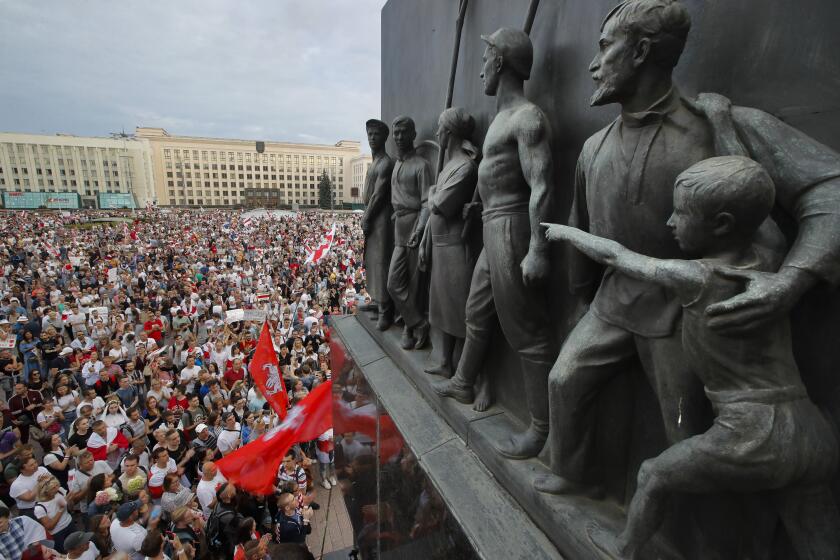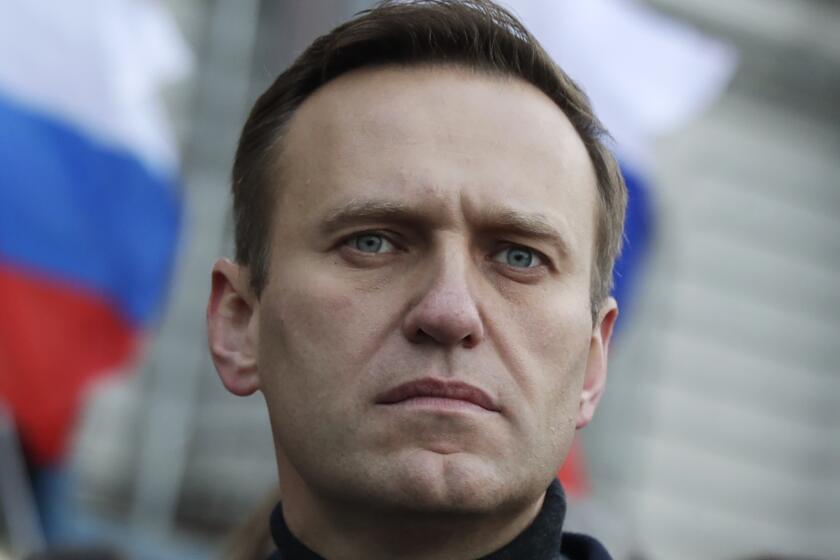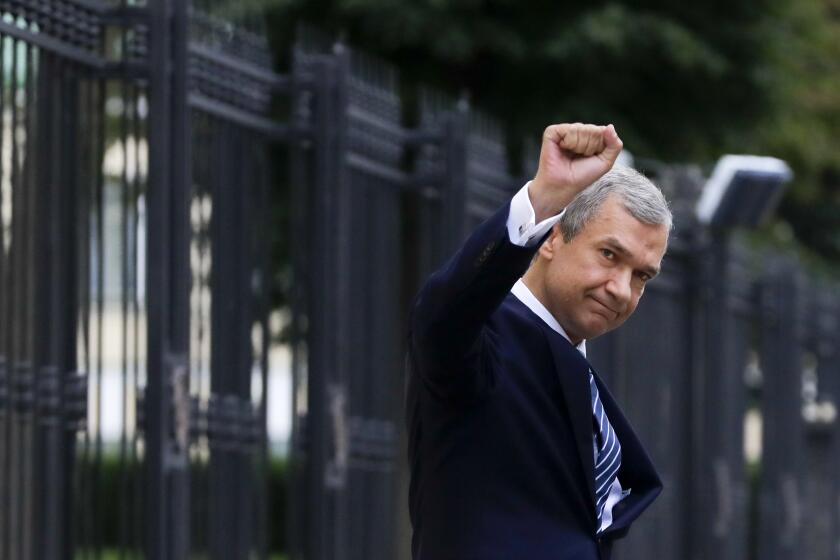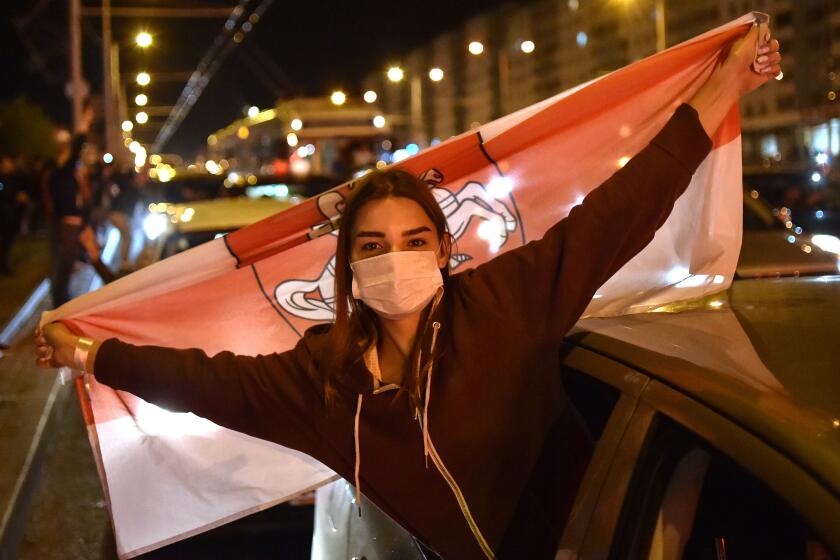Putin warns that Russia stands ready to help Belarusian leader
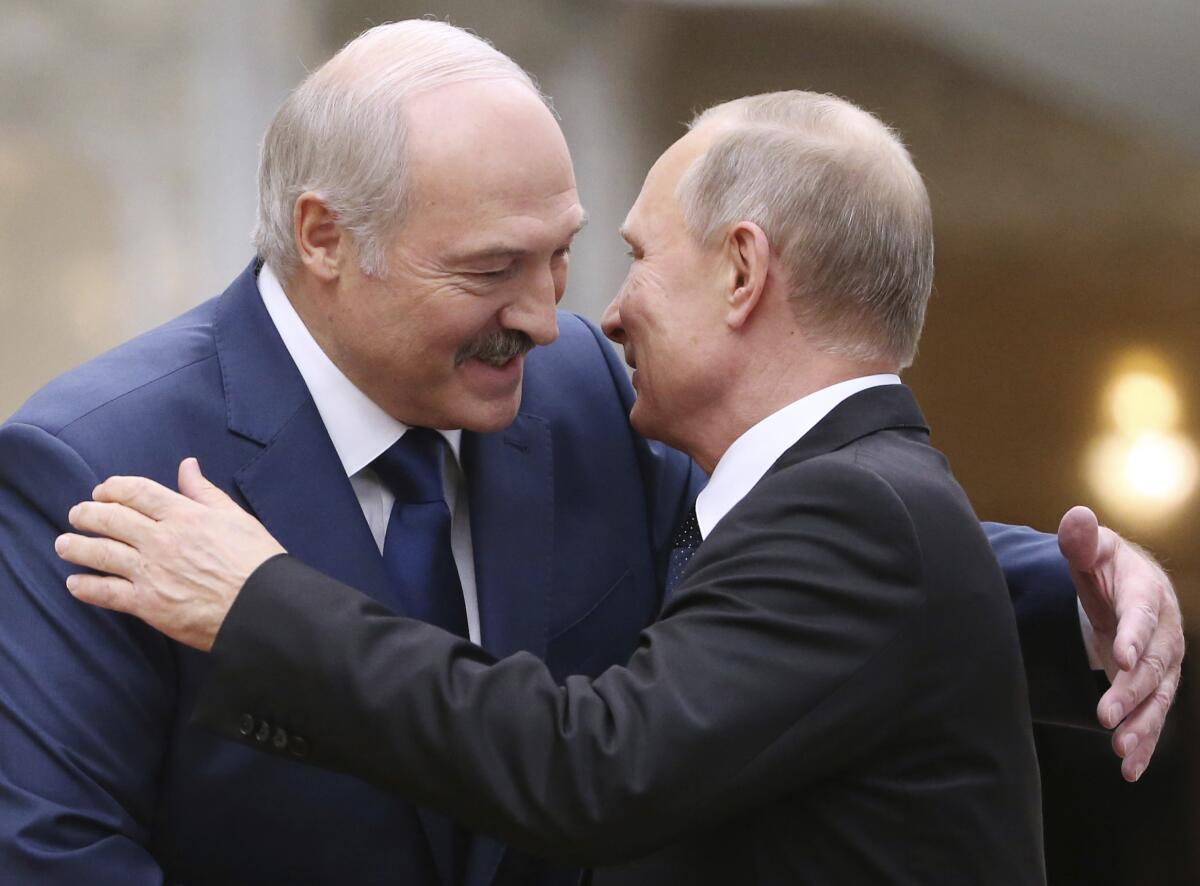
- Share via
MINSK, Belarus — Russian President Vladimir Putin warned that he stood ready to send police to Belarus if protests there turned violent, but he added in an interview broadcast Thursday that there was no such need at the moment and voiced hope that the situation in Belarus would stabilize.
Belarus’ authoritarian president of 26 years, Alexander Lukashenko, has faced weeks of protests against his reelection to a sixth term in an election, held Aug. 9, that the opposition says was rigged.
Putin told Russia’s state television that Lukashenko had asked him to prepare a Russian law enforcement contingent to deploy to Belarus if necessary.
Putin said that he and Lukashenko had agreed there was “no such need now, and I hope there won’t be.”
“We have agreed not to use it until the situation starts spinning out of control,” Putin said, “and extremist elements acting under the cover of political slogans cross certain borders and engage in banditry and start burning cars, houses and banks or take over administrative buildings.”
In an apparent jab at the West, which has condemned Lukashenko’s crackdown on protesters and urged him to launch a dialogue with the opposition, Putin accused unidentified foreign forces of trying to win political advantage from the turmoil in Belarus.
Short of using military force, Moscow can shape events in Belarus through networks developed by its security forces, economic levers and media sabotage.
“They want to influence those processes,” Putin said, “and reach certain decisions, which they think conform with their political interests.”
Russia sees Belarus as a key bulwark against Western expansion and an important conduit for Russian energy exports. The two countries have a union agreement envisaging close political, economic and military ties, and Lukashenko has relied on cheap Russian energy and other subsidies to keep his country’s Soviet-style economy afloat.
Despite the close cooperation, Russia-Belarus relations have often been strained by disputes. Lukashenko frequently has made overtures to the West and accused Moscow of hatching plans to incorporate Belarus.
Just before the election, Belarus arrested 32 private Russian military contractors on charges of planning to stage riots. Belarusian authorities released the men shortly after the vote in a bid to mend ties with the Kremlin amid rising Western criticism.
Russian police have announced a preliminary probe into the sudden illness of opposition leader Alexei Navalny, who supporters say was poisoned.
In the interview, Putin described the incident as a provocation by Ukrainian and U.S. spy agencies, charging that they had lured the Russians to travel to Belarus by promising them jobs in a third country and made the Belarusian authorities believe they were on a mission to destabilize the nation.
Seeking Moscow’s support, Lukashenko has cast the protests against his reelection as part of a Western plot to weaken Russia.
On Thursday, he accused Belarus’ neighbors of open interference with their push for a new election. He accused Poland, an EU member, of harboring plans to take over the Grodno region on the border, saying that it prompted him to deploy additional Belarusian troops to the frontier.
Polish Prime Minister Morawiecki dismissed such claims last week, emphasizing that Poland fully respected Belarus’ sovereignty.
Authorities in Belarus are steadily cranking up the pressure on protesters who are pushing for the resignation of the country’s authoritarian leader.
The United States and the European Union have criticized the presidential election as neither free nor fair and encouraged Belarusian authorities to engage in a dialogue with the opposition.
Lukashenko, who has ruled the nation of 9.5 million with an iron fist since 1994, has dismissed the protesters as Western puppets and refuses to engage in dialogue with the opposition.
After a brutal crackdown on demonstrators in the first days of post-election protests, when nearly 7,000 people were detained, hundreds were injured and at least three protesters died, authorities changed tactics and let daily demonstrations go unhindered for nearly two weeks. The government, meanwhile, has maintained pressure on the opposition with threats and selective jailing of its leaders.
On the 19th straight day of protests Thursday, several dozen women stood on the Belarusian capital’s main Independence Square with their hands bound to protest the police dispersal of a rally there the previous night.
After “Europe’s last dictator” claims election win in Belarus, days of protests put spotlight on women.
“Putin must be ashamed — he’s promising to add Russian clubs to the Belarusian ones,” said 45-year-old protester Regina Fustovich. “We saw that Putin supports Lukashenko, not the Belarusian people.”
Putin defended the Belarusian authorities’ response to protests, saying that police in Belarus have shown “restraint.”
He accused Western critics of Belarus of hypocrisy and double standards, pointing at examples of violent police action, such as when “they shoot an unarmed man in the back while his three children were sitting in a car,” in a reference to the police shooting of Jacob Blake, a Black man, in Kenosha, Wis. Blake was shot in the back seven times on Sunday as he leaned into his SUV, with three of his children seated inside.
As part of a multi-pronged effort to stifle protest, Belarusian prosecutors have opened a criminal probe against the opposition Coordination Council, which was created to facilitate a transition of power.
News Alerts
Get breaking news, investigations, analysis and more signature journalism from the Los Angeles Times in your inbox.
You may occasionally receive promotional content from the Los Angeles Times.
Belarusian courts this week have handed 10-day jail sentences to two council members and summoned several others, including Svetlana Alexievich, who won the 2015 Nobel Prize in literature, for questioning.
Another council member, Maria Kolesnikova, a close associate of the main opposition challenger in the vote, Sviatlana Tsikhanouskaya, was called in for questioning Thursday.
“It’s part of the pressure on civil society,” she told reporters outside Belarus’ Investigative Committee headquarters. “The authorities are refusing to listen to the people.”
EU nations’ ambassadors to Belarus warned Thursday that “prosecution of Coordination Council members on grounds presented by the authorities is unacceptable.”
At a meeting Thursday in Berlin, European foreign ministers are expected to approve a list of 15 to 20 Belarusian officials who would face travel bans in the EU and a freeze on their assets. Lithuania is demanding that 118 people be blacklisted.
More to Read
Sign up for Essential California
The most important California stories and recommendations in your inbox every morning.
You may occasionally receive promotional content from the Los Angeles Times.
